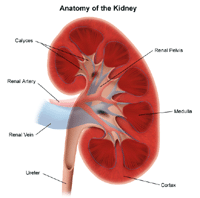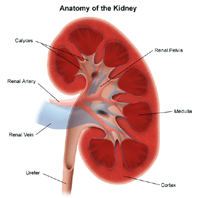Congenital Nephrotic Syndrome
What is congenital nephrotic syndrome?
Congenital nephrotic syndrome, an inherited disorder characterized by protein in the urine and swelling of the body, occurs primarily in families of Finnish origin and develops shortly after birth. The disorder commonly results in infection, malnutrition and kidney failure. It can often lead to death by five years of age.
Symptoms
Symptoms include low birth weight, body swelling, decreased urine output, foamy appearance of urine, poor appetite and cough.
Diagnosis
An examination reveals massive fluid retention and generalized swelling. Abnormal sounds are heard when listening to the heart and lungs with a stethoscope. Blood pressure may be high, and the patient may have signs of malnutrition. A urinalysis may reveal large amounts of protein and the presence of fat in the urine. The disorder can be screened for during pregnancy by finding elevated levels of alpha-fetoprotein on a routine sampling of amniotic fluid. Genetic tests should be used to confirm the diagnosis if the screening test is positive.
Treatment
Early and aggressive treatment is required to control the disorder. Diuretic medications help rid the body of excess fluid. ACE inhibitor medications and nonsteroidal anti-inflammatory drugs are used to slow the spilling of protein in the urine. Antibiotics may be needed to control infections. Dietary modifications may include the restriction of sodium and use of dietary supplements. Fluids may be restricted to help control swelling. Removal of the kidneys, dialysis and kidney transplant may be recommended.
Prognosis
Congenital nephrotic syndrome may be successfully controlled in some cases with early and aggressive treatment, including early kidney transplantation, but many cases are fatal within the first year.





